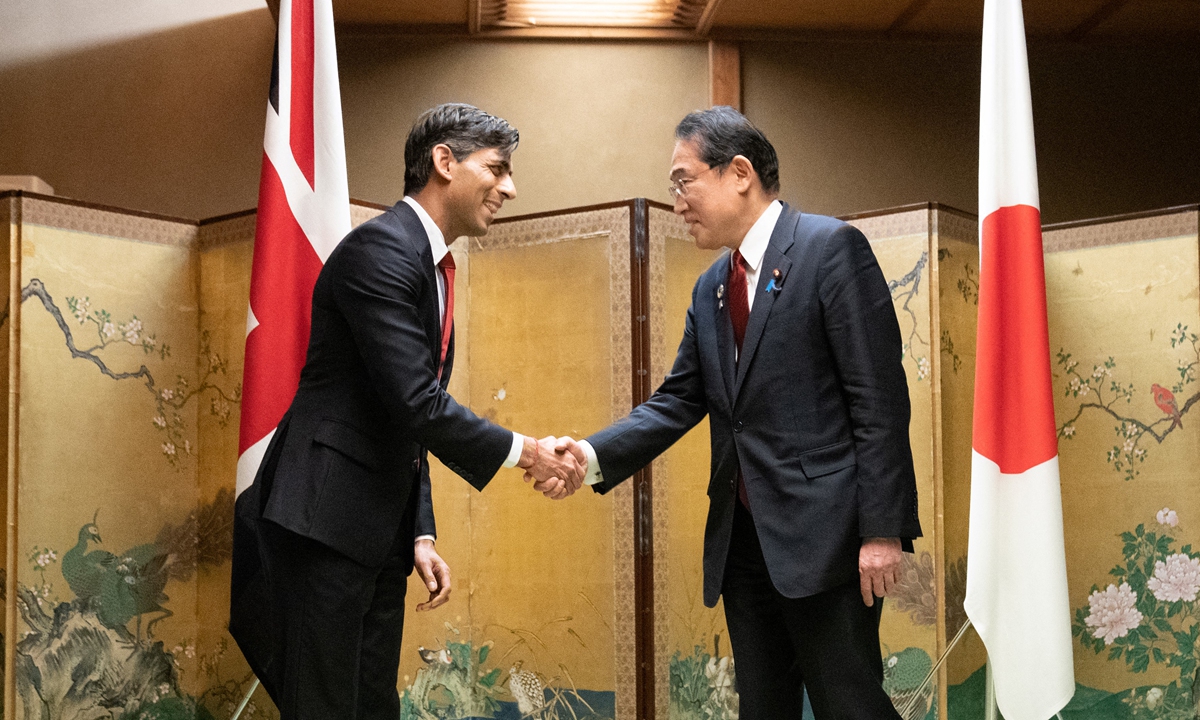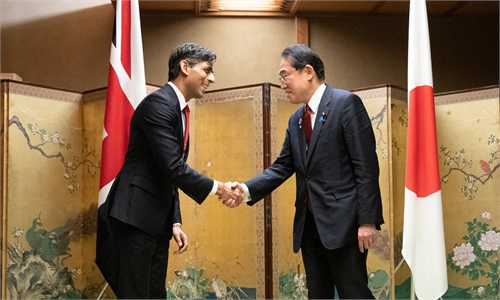Sunak slammed as 'parroting with prejudice' for labeling China 'biggest challenge'
Post-Brexit UK desperate to please US, offset waning strength: analysts

Britain's Prime Minister Rishi Sunak meets Japanese Prime Minister Fumio Kishida during their bilateral meeting in Hiroshima on May 18, 2023.Photo: AFP
China on Monday firmly opposed and strongly condemned the wrongful claims made by British Prime Minister Rishi Sunak after the Group of Seven (G7) summit in which he called China the "biggest challenge of our age to global security and prosperity," saying that the British leader was simply parroting other people's words that constituted malicious slanders in disregard of the facts.
Rejecting Sunak's Sunday provocations, the Chinese Embassy in the UK issued a statement on Monday: "Anyone without prejudice can see that China is a builder of world peace, a contributor to global development, and a defender of the international order, while the US and a handful of its vassal countries have kept interfering in the internal affairs of other countries and provoked confrontation. They are the ones that pose the biggest challenge to global security and prosperity," the embassy spokesperson said.
"We urge British politicians to focus more on dealing with the long-standing political, economic and social problems in their own country, instead of always dancing to the tune of the US, stirring up trouble around the world, and creating division and confrontation. We call on the British side to stop slandering and smearing China so as to avoid further damage to China-UK relations," the spokesperson urged in the Monday statement.
Chinese analysts viewed the post-Brexit British leader's latest remarks on China as a symbolic move aimed at pleasing the US, especially after Japan - one of the G7 nations - voiced rather strong willingness to make itself the US' first mate in the Asia-Pacific region in Washington's anti-China campaign.
Sunak's increasingly hostile rhetoric against China can also be viewed as a key expression of London's bid to court the US, according to Lü Xiang, a research fellow at the Chinese Academy of Social Sciences. The UK, with its waning power on the world stage following Brexit, urgently needs to endear itself to the US - its main but geographically distant ally - to avoid jeopardizing the balance with its close European neighbors.
Cui Hongjian, director of the Department of European Studies at the China Institute of International Studies, told the Global Times on Monday that after taking office, Sunak has made several adjustments in terms of defining his government's China attitude, developing it from a "systemic challenge to British values and interests," to the current "biggest challenge of our age to global security and prosperity," from which we can see a quantitative change based on prejudices but not yet a qualitative one, as the term "threat" is still not being used.
The G7 summit ended with obvious divisions among the group of nations, with the US, UK and Japan taking an aggressive attitude on China while Europe showed balance and reluctance to follow suit, according to Cui.
By making the most aggressive remarks to provoke China, Sunak is simply trying to create publicity to offset the fact that the UK's international status and influence is obviously in decline, Cui noted.
However, it would not be a surprise if shrewd British politicians do not turn the hawkish talk into action, analysts noted.
Earlier in May, Britain's Minister for Investment Dominic Johnson paid a rare visit to China's Hong Kong, during which he held a series of meetings with the special administrative region's government officials and executives, which was welcomed by observers as a sign of London's eagerness to engage deeper with China on economic cooperation after the fallout of Brexit.
In an opinion piece published in the Hong Kong-based South China Morning Post on the visit, Johnson wrote that the "UK will continue to engage robustly and constructively" with China where their interests converge.
Ahead of the G7 summit, Sunak and Japanese Prime Minister Fumio Kishida agreed on a landmark new global strategic partnership called the Hiroshima Accord when they met. From doubling the number of British troops participating in a Japan-based military exercise to deploying a UK aircraft carrier to the Indo-Pacific again in 2025, as well as promoting cooperation on semiconductors, the accord seeks to cement the countries' deepening relationship.
This shows the British government's opportunism, Lü told the Global Times on Monday.
The British leader on Sunday also claimed that "China is the only country with both the means and intent to reshape the world order," in a move Chinese analysts viewed as being made "only to justify its anti-China policies."
When it comes to understanding China, countries like the US and the UK share a prejudice that any powerful country must seek hegemony and build a new world order to influence others like they did, Cui noted.
In fact, China has always played an active role in defending and improving the world order, which goes beyond the narrow definition of the US or G7 countries, where only a few developed countries dominate global governance and connectivity resources, Lü pointed out.
As a developing country, China shares with the world, especially fellow developing countries, its successful experience on getting rid of poverty, shouldering its responsibility under the principle of "extensive consultation, joint contribution and shared benefits," he said.



